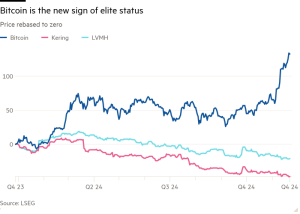The best recent politics books — insights on conflict
Unlock the US Election Countdown newsletter for free
The stories that matter on money and politics in the race for the White House
David Sanger’s history of US foreign policy during the Biden presidency is a perfect example of the maxim that journalism is the first draft of history. As the New York Times national security correspondent, Sanger has had excellent access to the people making US foreign policy during this turbulent and dangerous period.
The central event in his story is inevitably Russia’s full-scale invasion of Ukraine in February 2022. But Sanger also provides fascinating accounts of the rise in US-China rivalry, the end of the war in Afghanistan and the tensions between the Biden White House and the Netanyahu government in Israel.

New Cold Wars (Scribe, £18.99/Crown, $33) does not contain any revelations that will fundamentally change the standard account of world affairs during the Biden years. But it does provide fascinating details of what was going on behind the scenes — and so makes America’s decision-making process much easier to understand.
Sanger gives a convincing account of how and when America learned of Putin’s intention to launch a full-scale invasion of Ukraine — and what the White House did to try to avert the war, including a secret mission to Moscow by Bill Burns, the director of the CIA. Both Burns and Jake Sullivan, the president’s national security adviser, give the author on-the-record accounts of their actions.
Alongside its many strengths, New Cold Wars has two minor weaknesses. The author’s efforts to set the events in a broader historical and intellectual context are less original than his reporting. He is not the first person to suggest that Fukuyama’s “end of history” thesis has been falsified by events; or to point out that hopes that capitalism would lead to political liberalisation in China did not work out.
Sanger’s portrait of the new cold war is also very much the world as viewed from Washington. Given America’s role as the world’s foremost military power and the guarantor of the current world order, that is a crucial perspective. But the history of the new cold war — if that is what it is — also requires an account of how things look from the other side of the divide.

Readers trying to understand what was happening inside Russia would do well to turn to Sarah Rainsford’s Goodbye to Russia (Bloomsbury, £22), her fascinating and personal account of Russia’s descent into despotism.
Rainsford has devoted much of her life to trying to understand Russia — first as a student and then as a journalist. She felt so invested in the country that she admits to feeling a sense of shame — as well as revulsion — when she realised that Russia really was intent on invading Ukraine.
Her first encounter with Russia came in 1992, as an 18-year-old exchange student — experiencing everything from the temperature in Moscow (-23C) to the underground raves. Making skilful use of her student diaries and letters, she paints a vivid portrait of Russia as the “country was first opening up, long before Putin and his wars”. After witnessing the flowering of freedom and the “deadly scramble for wealth” in the 1990s, Rainsford returned as a BBC journalist in the 2000s, covering the restoration of order and violent authoritarianism under Putin’s rule.
Many of the journalists and democratic politicians who became Putin’s victims — such as Boris Nemtsov, Anna Politkovskaya and Alexei Navalny — were people Rainsford knew, and she gives vivid and moving accounts of their struggles, mixed in with on-the-ground reportage of the lives of ordinary Russians. And she argues plausibly that there is a direct connection between Putin’s repression at home and his aggression overseas.
Beyond the immediate questions of why Putin chose to invade Ukraine, there lies a deeper question: why is war such a recurrent feature of human affairs? This is the question that Richard Overy chooses to tackle in his fascinating new book, Why War? (Pelican, £22/WW Norton, $27.99).

Overy is one of Britain’s foremost historians of the second world war, so he is deeply versed in the diplomatic and political reasons why states choose warfare. But, in his new book, he looks at different and deeper perspectives on that question. War, as he explains, is a recurrent feature of human history. Anthropologists who argued that ancient civilisations were predominantly peaceful were, in his view, simply wrong. Archeological digs have repeatedly revealed how common violent deaths were in ancient societies.
Overy examines the question of why mankind has repeatedly resorted to warfare from the viewpoint of a variety of disciplines including psychology, ecology and political science. He argues, for example, that Freudian accounts of the origins of warfare are not particularly helpful, but that explanations rooted in evolutionary psychology are more convincing. These suggest that societies that were struggling to survive or expand found it useful to create a “psychological acceptance of warfare as a male obligation”.
There is no single headline-grabbing answer to the question “why war?”. In Overy’s view, the answer usually involves a variety of factors and differs over time. But what becomes clear from reading his account is that growing technological and social sophistication have not freed mankind from the urge to conquer and kill.
Join our online book group on Facebook at FT Books Café and subscribe to our podcast Life and Art wherever you listen
#politics #books #insights #conflict




